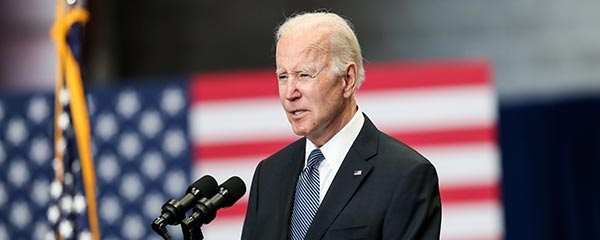Story Highlights
- 38% to 43% have confidence in U.S. leaders on the economy
- Confidence in Biden, Powell, Democratic leaders fell by double digits
- Confidence ratings for all leaders are below historical averages for each
WASHINGTON, D.C. -- Public confidence in key U.S. leaders' management of the national economy is shaken amid the highest inflation rate in more than 40 years and Americans' increasingly bleak assessments of the national economy and their own financial situations.
Less than half of U.S. adults say they have "a great deal" or "a fair amount" of confidence in Federal Reserve Chairman Jerome Powell (43%) or President Joe Biden (40%), as well as Republican (40%) and Democratic (38%) leaders in Congress, to do or recommend the right thing for the economy.
Since last April, as the U.S. inflation rate has more than doubled, Americans' confidence ratings for Biden's and Powell's economic management declined by double digits. Confidence in Democratic congressional leaders has also fallen sharply and is now statistically similar to that for Republican congressional leaders, which is essentially unchanged from last year.
Gallup's Economy and Personal Finance Poll was conducted April 1-19, before the announcement that the U.S. gross domestic product declined in the first quarter of 2022. The next Federal Reserve meeting is set for this week, and Powell is expected to raise interest rates in an effort to combat increasing inflation.
Differences in Confidence Levels Driven by Partisan Divide
While Americans' confidence in the various leaders' economic abilities ranges from 38% to 43%, there are larger differences in the percentages who say they have "only a little" or "almost none." Just over four in 10 U.S. adults have almost no confidence in Biden and Democratic congressional leaders' economic competence, while fewer say the same of Republican leaders (30%) and Fed Chair Powell (22%). The public is least familiar with Powell, as 10% do not have an opinion of him.
The variations in confidence levels of these key leaders are driven by partisans' differing outlooks. Strong majorities of Democrats express confidence in the economic competence of Biden (80%), congressional Democratic leaders (77%) and Powell (61%), while fewer, 19%, are confident in Republican congressional leaders. Republicans are significantly less confident than Democrats in the opposing party's leadership (6%). Likewise, few Republicans are confident in Biden (8%). Republicans are more confident in Powell (31%) and their own party's leaders (66%), though not to the same extent as Democrats' views of their own party leaders.
Biden Below Historical Average for Presidential Management of Economy
Since 2001, U.S. presidents have averaged 52% confidence for their skill in recommending the right thing for the economy. In his first year in office, Biden earned a 57% confidence rating, but this year's 40% is on the low end for recent presidents.
Although his handling of the nation's economy was a strength for Donald Trump, the public's confidence in his abilities on it was below average, ranging from 42% to 48%. Barack Obama fared better than Trump. His confidence ratings were at least 50% in each year except one, 42% in 2014, and he earned a 71% rating in his first year in office. George W. Bush began his presidency inspiring similarly high confidence, but by the end of his term, amid the Great Recession, just 34% of Americans expressed confidence in his economic abilities.
Confidence in Powell Below Historical Average for Fed Chair
Powell's latest economic confidence reading of 43% is below his term average of 50%, which is also the historical average for the Federal Reserve chairperson over the past 22 years. Alan Greenspan, who served five terms in the position, inspired majority-level confidence for each of Gallup's five readings between 2001 and 2005.
In contrast, the two chairs of the Federal Reserve who followed Greenspan -- Ben Bernanke and Janet Yellen -- failed to register confidence ratings above 50%, and each averaged far lower ratings over their terms in office, 44% and 41%, respectively.
Below-Average Confidence in Democratic, Republican Congressional Leaders
Historically, Americans' confidence in congressional leaders' ability to do the right thing for the economy has been lower than for presidents and Federal Reserve chairs. The confidence ratings of congressional Democratic leaders have not been at the majority level since 2009, and it has been even longer -- since 2003 -- for Republican congressional leaders.
The current 38% confidence rating for Democratic leadership is near the all-time low of 35% recorded in 2014; however, the latest rating of 40% for Republican leadership is well above the 24% low for that group, also in 2014. The latest readings are below the averages of 47% for Democratic leaders and 44% for Republican leaders.
Bottom Line
While a challenging economic climate has not always resulted in low confidence readings for U.S. leaders on the economy, the latest economic woes appear to be coloring the public's views of leaders' skill. The state of the economy is weighing on Americans' minds, and if inflation and economic growth do not improve, the leaders Americans expect to manage the economy are likely to suffer further declines in confidence.
To stay up to date with the latest Gallup News insights and updates, follow us on Twitter.
Learn more about how the Gallup Poll Social Series works.



